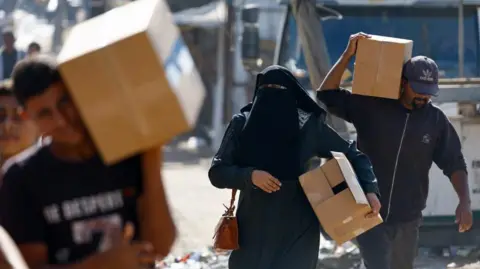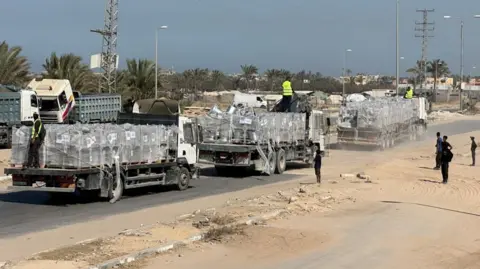Sean Seddon,
Wahiba Ahmed and
Anna Foster
Gaza is experiencing a health “catastrophe” that will last for “generations to come”, the director-general of the World Health Organization (WHO) has warned.
Dr Tedros Adhanom Ghebreyesus told BBC Radio 4’s Today programme that a massive increase in aid is needed to begin to address the complex needs of the Strip’s population.
Israel has allowed more medical supplies and other aid to cross into Gaza since a ceasefire with Hamas came into effect on 10 October, but Dr Tedros said levels are below those needed to rebuild the territory’s healthcare system.
His intervention comes as the US attempts to shore up the ceasefire it helped to broker following an outbreak of violence at the weekend.
The agreement has been described by the White House as the first phase of a 20-point peace plan that includes an increase to the amount of aid entering Gaza, and supplies distributed “without interference” from either side.
Dr Tedros told the Today programme he welcomed the ceasefire deal but said the increase in aid that followed has been smaller than expected.
Asked about the situation on the ground, he said Gazans had experienced famine, “overwhelming” injuries, a collapsed healthcare system, and outbreaks of disease fuelled by the destruction of water and sanitation infrastructure.
He continued: “On top of that, [there is] restricted access to humanitarian aid. This is a very fatal combination, so that makes [the situation] catastrophic and beyond words.”
Asked about long-term health prospects in Gaza, he added: “If you take the famine and combine it with a mental health problem which we see is rampant, then the situation is a crisis for generations to come.”
Tom Fletcher, head of the United Nations Office for the Coordination of Humanitarian Affairs, said earlier this week that aid groups are “turning the tide on the starvation crisis” but that “far more” was needed.
On Tuesday, the UN’s World Food Programme said lorries carrying more than 6,700 tonnes of food had entered since 10 October, but that was still considerably below its 2,000-tonnes-a-day target.
Six hundred aid lorries a day need to be arriving in Gaza but the average is between 200 and 300, Dr Tedros said, as he called on Israeli authorities to “de-link” aid and the wider conflict.
 Reuters
ReutersOn Sunday, Israel temporarily halted aid deliveries after it said two Israeli troops were killed in an attack by Hamas gunmen in Gaza. Hamas said at the time it was not aware of the clashes.
The Israeli military responded with a series of air strikes across the territory, killing dozens of Palestinians.
The aid deliveries resumed the following day after heavy international pressure.
Dr Tedros said aid should not be “weaponised” and called on Israel not to impose conditions on its delivery, including over the return of the remains of dead hostages still in Gaza, which has become a key point of contention during the ceasefire.
Hamas has committed to returning the bodies but so far has transferred only 15 of 28, saying it has not been able to retrieve the rest.
Twenty living Israeli hostages were released by Hamas last week in exchange for almost 2,000 Palestinian prisoners and detainees in Israeli jails.
Dr Tedros told Today: “There should be full access, there should not be any condition, especially after all the living hostages were released, and a good part of the remains are transferred. I did not expect there would be additional restrictions.”
Asked about the role the US should play, Dr Tedros said “since the US has brokered the peace deal it has the responsibility of making sure that all sides are respecting” it.
Israel is currently operating two crossings – Kerem Shalom in the south-east, and Kissufim in central Gaza – but it has continued to face calls from aid groups for all the access routes it controls to be restored.
Dr Tedros said “all available crossings” were needed to get enough aid into Gaza, and called on Israel to allow aid groups previously been denied registration back into the territory, saying: “You can’t have a scaled up response without those who can deliver on the ground.”
 Reuters
ReutersHe also said supplies intended be used to restore Gaza’s health system have been confiscated at the border because Israeli authorities say they could have a military use.
“If you are going to build a field hospital, you need the canvas and the pillars [for tents],” he continued. “So if the pillars are removed, because of an excuse that they could be dual-use, then you can’t have a tent.”
Thousands of Palestinians are waiting for weekly medical evacuation flights, Dr Tedros said, though none have taken off for two weeks due to religious holidays in Israel. He said 700 people have previously died while waiting for medical evacuation and called on the number of flights to be increased.
Israel launched a military campaign in Gaza in response to the 7 October 2023 attack, in which Hamas-led gunmen killed about 1,200 people and took 251 others as hostages.
At least 68,229 have been killed in Israeli attacks in Gaza since then, according to the territory’s Hamas-run health ministry.
In July, a UN-backed body concluded that famine had occurred in Gaza, though Israel disputed the findings, saying there was “no starvation”.
The UN has previously estimated it will cost $70bn (£52bn) to reconstruct Gaza. Dr Tedros said around 10% of that figure would need to be spent on its badly damaged health system.
He continued: “We have been saying for a long time that peace is the best medicine.
“The ceasefire we have is a very fragile one and some people have died even after the ceasefire because it was broken a couple of times.
“What is very sad is many people were cheering in the streets because they were very happy there was a peace deal. Imagine, [some of] those same people are dead after they were told the war is over.”
www.bbc.com (Article Sourced Website)
#Gaza #health #crisis #generations #chief #warns

